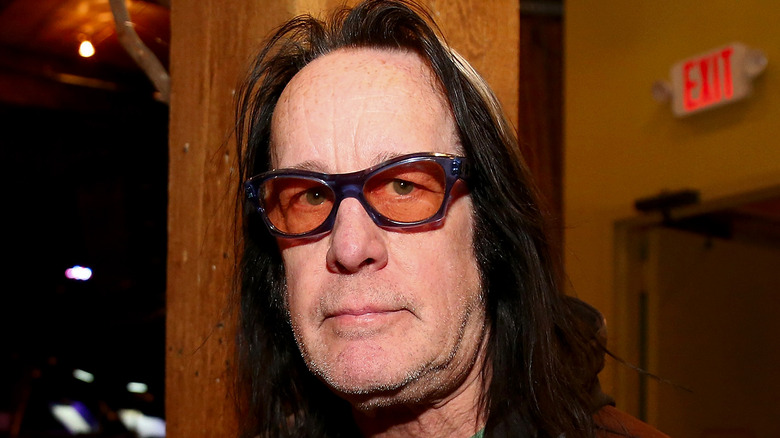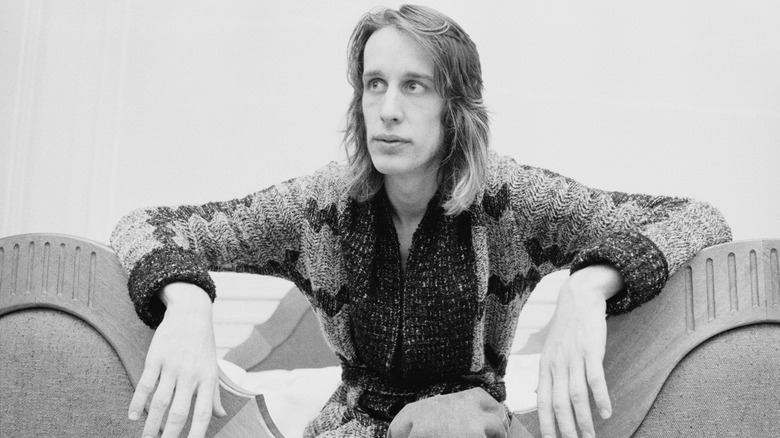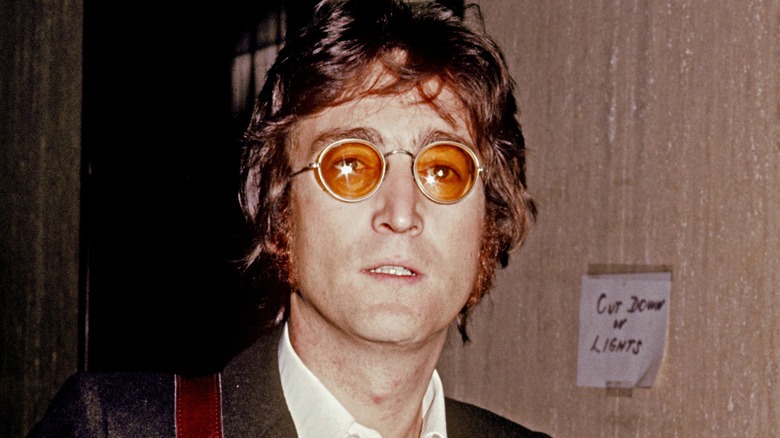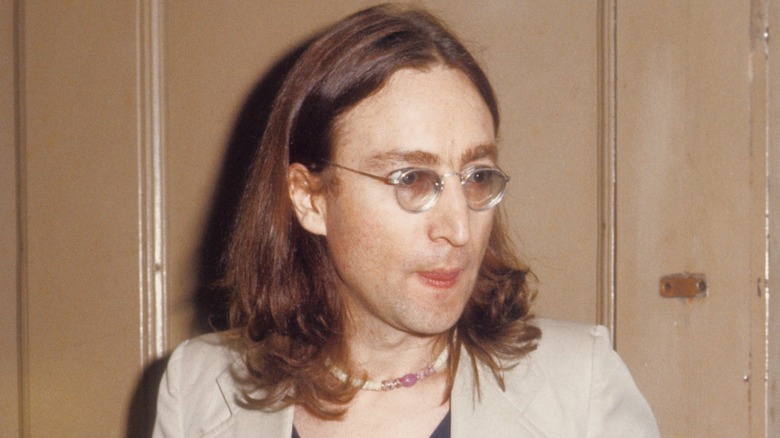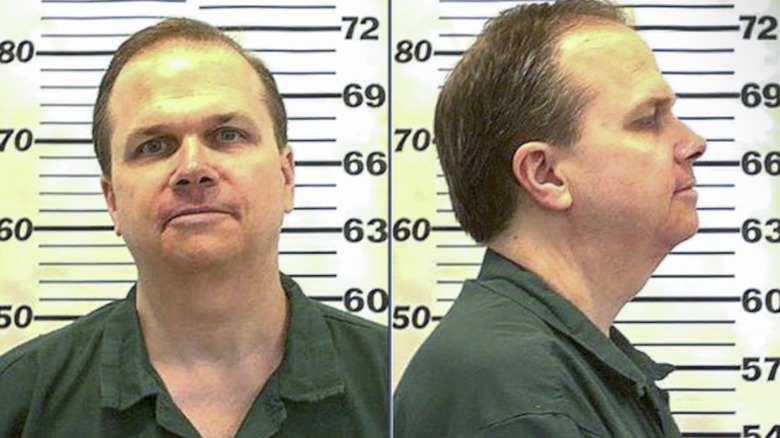The Truth About Todd Rundgren's Feud With John Lennon
Nowadays, it's no longer shocking when one famous musician feuds with another — that's basically Taylor Swift's career in a nutshell. But back in the 1970s, it was relatively uncommon for two rock stars to beef in public or to openly react to what one of them said in a magazine interview, much like what happened in the feud between Todd Rundgren and John Lennon. On one end, you had a versatile and talented singer-songwriter who got some attention playing psychedelic rock with the Nazz but truly broke out a few years later with his super-catchy ode to infidelity, "I Saw the Light." On the other end, you had one-half of the songwriting team that wrote most of the Beatles' songs, at that time enjoying success as a solo act while in the middle of his infamous "Lost Weekend." (Which lasted way longer than one literal weekend, mind you.)
Although it didn't turn out to be a long-running rivalry, it was nonetheless interesting for rock fans to witness two of the most popular musicians of the era sniping at each other on the pages of a leading British music publication. What were they beefing about, and how did the two rockers eventually make nice with each other? Here's the truth behind the Todd Rundgren vs. John Lennon feud of 1974.
Rundgren called Lennon out for hypocritical behavior
The first shots in the feud were fired by Todd Rundgren, who sounded off on John Lennon in a 1974 interview with Melody Maker. As quoted by Far Out Magazine, the American musician pulled no punches, calling out his British counterpart on his perceived hypocrisy as a man who espoused progressive views in his music but had a history of questionable behavior, particularly toward women. "John Lennon ain't no revolutionary," he said. "He's a f***ing idiot, man. Shouting about revolution and acting like an a**. It just makes people feel uncomfortable." Rundgren then went on to suggest that Lennon was only promoting said views as a ploy to gain attention.
Aside from the incident where Lennon purportedly hit a waitress (as alleged by Rundgren), there were other, confirmed instances where the former Beatle was physically abusive toward women. In his now-iconic 1980 interview with Playboy (via the Mirror), Lennon admitted that he "fought men" and "hit women," noting that he already alluded to this dark side of his personality in the final verse of the Beatles' 1967 track "Getting Better." (Which, interestingly, featured Paul McCartney on lead vocals.)
Additionally, Rundgren opined that his former band, the Nazz, was more creative than the Beatles, whom he claimed had no style other than their own. One could definitely counter that the Fab Four were also capable of playing hard rock songs and "light, pretty ballads" with complex structures. And were far more successful than the Nazz ever were.
Lennon responds with an open letter to 'Sodd Runtlestuntle'
John Lennon was quick to respond to Todd Rundgren's comments from his Melody Maker interview. And as you may expect, he made sure to craft that response with his trademark brand of playful humor, though he was clearly salty at various points of his "OPENED LETTUCE TO SODD RUNTLESTUNTLE," as quoted by Far Out Magazine. (In the first paragraph of the letter, he once again mangled Rundgren's name, this time referring to him as "Turd Runtgreen." Classic Lennon.)
In his response, Lennon started out with a backhanded compliment for Rundgren, admitting that he liked his 1972 hit "I Saw the Light" but adding that it sounded a bit similar to the Beatles' "There's a Place," a deep cut from their debut album "Please Please Me." He then proceeded to counter each and every one of the remarks Rundgren made, starting by saying that he "never claimed to be a revolutionary," then stressing that he never hit a waitress as alleged; he did, however, acknowledge that he was drunk and he "[acted] like an a**" during the incident in question.
While alternately referring to Rundgren as "Rodd," "Dodd," and "Godd," Lennon continued his missive by sarcastically pointing out that the former Nazz frontman wasn't really that original, and noting that the Beatles "[covered] a lot of [styles] man, including your own." He concluded things by suggesting that Rundgren was so angry because he didn't recognize him when they bumped into each other in Los Angeles.
"Anyway, However much you hurt me darling; I'll always love you," read the final line of Lennon's opened lettuce, er ... open letter.
The feud really didn't last that long
Had the Todd Rundgren and John Lennon feud happened today, it would have been all over social media, with fans from both camps hurling barbs at the other and YouTube "drama channels" spilling more "tea" in hopes that the beef would last longer. However, the 1970s were much simpler times, and that meant the two brilliant musicians buried the hatchet in short order. Sure, Rundgren might not have given the Beatles the credit they deserve when he spoke to Melody Maker, and Lennon may have been hitting below the belt by baselessly insinuating that Rundgren was obsessed with him because he had daddy issues. But when everything was said and done, it was all a case of the U.K. publication trying to stir the pot — just like the aforementioned social media stans and drama channels do nowadays. And Rundgren and Lennon wised up to it pretty quickly.
"That was more of a stunt, really, cooked up by the paper so they could splatter the acrimony across their pages like blood!" Rundgren told The Guardian in 2013. "Ultimately, though, John and I realized we were being used and I got a phone call from him one day and we just said: 'Let's drop this now.'"
Did Rundgren's interview drive Mark David Chapman to murder Lennon?
John Lennon and Todd Rundgren's feud may not have lasted long, but some have alleged that it was Rundgren's Melody Maker interview that caused Lennon's assassin, Mark David Chapman, to feel betrayed by his onetime hero (via The Guardian). The interview was conducted by Allan Jones, who would later become the magazine's editor, and in 2007, he said as much to Press Gazette, admitting that "unfortunately, it was the article that [Chapman] read and went bonkers over because he was a big Rundgren fan. It's often quoted as the article that set Chapman off on his murderous run."
When The Guardian mentioned the allegations to Rundgren, the veteran musician said that he "[doesn't] feel any connection" to Chapman. He added that he wasn't aware that the convicted killer was such a big fan of his music — Chapman was wearing a promotional T-shirt for Rundgren's "Hermit of Mink Hollow" album when he shot Lennon — until "way after the fact." He also emphasized that having obsessed stalkers and, in some cases, receiving death threats, comes with the territory of being a public figure.
As for Chapman, he told parole officers during a 2020 hearing that he killed Lennon in 1980 because he was jealous of the ex-Beatle's wealth and lifestyle and that he was mainly motivated by his quest for "self-glory," per ABC News. To no one's surprise, that was the 11th time he was denied parole.
